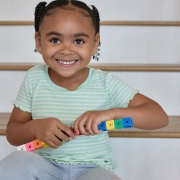Anna Yudina, Genius Of Play, (USA) In Conversation with Edx Education
Episode 34- Heather Welch Edx Education will be in conversation with Anna Yudina, Senior Director of Marketing at the Toy Association.
Anna is one of the driving forces behind the Genius of Play initiative an award winning program that promotes children, families well just about everyone to play. The Genius of Play movement to raise awareness of play as a crucial part of child development and encourage families to make time for play in their daily lives. The Genius of PlayTM has generated over 18 million engagements and over 2 billion impressions among its target audience.
Today we are chatting to Anna about, play based learning, value of play, the Genius of Play initiative and trends in the USA on play.
Here are the highlights:
{1:37} About The Genius of Play
{4:50} Bringing play back to families
{8:15} Rediscovering the fun of unstructured play
{11:52} Changing play habits during lockdown
{15:12} What to look for in a good quality toy
{20:02} The trends in 2021-2022
{22:09} Play for adults
Heather Welch (00:02):
You’re listening to education experts with edx education. Education is evolving. Join Heather Welch TriMedX education chatting with teachers, psychologists, parents, authors, creators, and other tons of experts to keep up with the trends and what’s happening from around the globe. This podcast series edx education discusses, home learning, school readiness, being creatives, changing in education, discussing what’s next hands-on learning. Or as we like to say, learning through play,
Heather Welch (00:38):
Hello everyone. I’m Heather Welch from edx education and today be in conversation with Anna Yudina senior director of initiatives at the toy association based in the USA, and is one of the driving forces behind the genie supply initiative, an award-winning program that promotes children, families, world, just about everyone to play. The genie supply initiative movement is to raise awareness of play as a crucial part of child development and encourage families to make more time for play as a crucial part of their daily lives. Today we’re chatting to enter about play-based learning value of play, the genius supply initiative and trends in the USA on play. Welcome, Anna.
Anna Yudina (01:19):
Hi Heather. Thanks for having me. I’m so excited to chat with you.
Heather Welch (01:23):
Oh, it’s wonderful. You could join us today and we’re very excited too, because it’s a subject that I’m very passionate about myself, which is play so, and I would love you first of all, to introduce to our audience, what exactly is the genie supply initiative?
Anna Yudina (01:37):
Well, you actually did a very well, it is the initiative by the choice association to raise awareness about the importance of play, all the wonderful benefits that it has for child development. And it has also evolved to become a great resource for parents. So we have a lot of play ideas, expert advice, all the different inspiration activities and resources that parents and teachers might want in order to inspire play, whether it’s at home or in the classroom. And
Heather Welch (02:06):
I think it’s an amazing, it’s absolutely amazing. And I know that it has actually recently won quite a big award. Is that correct?
Anna Yudina
Yes. One of our public service announcements won a telly award. We run public service announcements on TV to promote the importance of play and educate parents and caregivers about all the great research that exists about the benefits of play. So our most recent campaign was called the worldwide headquarters of play and it’s launched right before the pandemic when everybody was home. So, and the campaign was shown the importance of play at home as a whole family, parents and kids together in homemade for sort of like this DIY very creative imaginary play. And it really resonated with people and yeah, it was, it was exciting. She’ll win an award. We’re proud of it.
Heather Welch (03:00):
And that’s amazing. Unstructured play at home is always one of the best things to do, but I would love to know what was the inspiration for founding the genius supply initiative from the toy association? How did it all come about?
Anna Yudina (03:12):
So I’ll tell you all about it. So the initiative started six years ago and before the toys realization launch that genius plan initiative, we really conducted a lot of research. A lot of third-party research spoke with a lot of different experts in child development in education, in psychology, all the different fields.
So from that research and the conversations that we have with the experts, what became clear is that play has all the different benefits for child development. That it’s really, really critical for physical, cognitive, social, emotional communication and creativity. So that was great, but there was also the other side of the story.
Experts, voice concerns, and they shared some alarming statistics with us about today’s kids playing less than previous generation. So a lot of experts will talking about the decline in play and the negative consequences that such a decline may have for kids for the future generations. So I would say the inspiration was shuffle. We were inspired by the research and facts and the opportunity to bring all that information should parents and caregivers, but also the need should bring, play back and inspire will play in families and in the classroom. And over the past six years, the genius of play has really evolved to become a trusted resource of play inspiration and resources. So we’re really trying to accomplish that mission on which we started six years ago.
Heather Welch (04:50):
And I love the fact that it’s bringing playback to the families, not just the children, but anyone can play. And recently you’ve had some brilliant social media. I think there was like an older, an older male and female though, in a wheel back, what do you call it? I call it a wheelbarrow and one had their leg up and they’re just saying plays for all ages. It was absolutely amazing. It just showed that a lot of laughter and a bit of fun and be creativity in their faces. So it’s not just for our [inaudible].
Anna Yudina (05:18):
Yeah, you’re right. You’re absolutely right. And, in fact, you know, our PSA campaign that we’ll let headquarters of place is plays critical to your physical and emotional wellbeing at any age. And we show in all the different generations of people, grandparents, parents, kids, because yeah, the research exists that shows that play is actually important for adults as well. Particularly there is a correlation between playfulness and lower stress level.
I think a lot of people can relate to that. There is a lot of stress in our lives at work and home, you know, anywhere we go interacting with people. So having that playful attitude, you know, it doesn’t mean necessarily you got to spend all your time playing, you know, we have, we all have your role and responsibility, but it’s this playful attitude. It’s this openness to play that allows people to manage stress a whole lot better.
Anna Yudina (06:12):
And that means that you happier about your life, that you’re more satisfied. You feel, you feel more motivated, more excited, and a lot of times at least show better productivities. So, you know, we actually recently conducted a survey among Hsu thousand parents and kids. And one thing we asked, does play help you be more productive at work. And the majority of Karen said that, yes, it does. You know, I choose find that when I play, when I spend time taking my mind off work and playing with my kids and doing something else, then I come back to work and I feel a lot more productive.
Heather Welch (06:49):
I spent a year like no other, I mean, I’m based in the UK and I know that you’re based in the USA and we’ve definitely had quite severe lockdowns in both and also working from home. It’s not necessarily, it’s the norm, like many people’s office may not go back to working within an office.
So you’ve got to have that sort of that playfulness and to switch off from work because now, you know, for some people that might be just a walk to the offices from the bedroom, maybe to a desk, or even just to the dining room, you know, it’s not very fun deed. So you need to switch off, you need all these, initiatives out there just to show you how important it is. Not only for you, but for the family, as you were saying for stress levels and everything. So such an important initiative to, to have, there was a really good quote.
Heather Welch (07:33):
I saw recently from Dr. Sarah Monday, and she said, our brains, our brains are wired to play and wide through play. And I thought, I love that because it allows us to see the importance of play. You many people don’t see the benefits and they just have unstructured and free play, which is what you’re talking about, making a dens and all that sort of amazing things that children do because they’re curious, they’re naturally really curious and they want to explore these different things. And sometimes as a parent, we end up moving into this club culture, you know, we, we take them to every club under the sun. So I mean, and that’s, we’ve all had a bit of a rest over that for the last, I suppose, 12 months, which has probably been quite nice.
Anna Yudina (08:15):
Yeah. I think a lot of people actually have rediscovered the fun of unstructured play and sort of like spontaneous play, not necessarily an organized activity, but just something that you do with your family is so yeah, a lot of people had a lot more time than they normally do less structured schedules. They were looking for activities and things. Should you. And I think play play was one of the things that they really helped people through the pandemic. You know, we’ve definitely heard it from parents that, that they were rediscovering play.
It will be interesting to see whether that continues as the world opens up, you know, right now in the United States thing. So looking much better than they did a year ago, we are cautiously optimistic and a lot of activities. I pushes me optimistic people, maybe not cautiously optimistic, but I am always cautious, but very optimistic as well.
Anna Yudina (09:11):
So a lot of activities is starting to come back and the schedules are starting to fill up again. You know, I talk to my coworkers, how was your weekend? And before it was like, well, you know, there was not a whole lot to do. And now it’s like, oh yeah, it was busy. Right. Which is, which is the typical answer in the United States, pre pandemic. And so it’s starting to come back, you know, that business that, the hectic sort of lifestyle.
So it will be really interesting to see how play evolves and, you know, would definitely hope that it remains a really important place. And that the fact that family has had this opportunity to rediscover play, you know, every day, with their kids, not necessarily something scheduled, definitely hope that we will continue as the world opens up.
Heather Welch (09:57):
I have to just mention here that there’s an amazing, that you’ve actually just launched. I saw this the other day, the genie supply portal now is that available to everyone and anyone around the world access that
Anna Yudina (10:08):
Absolutely. That is the beauty of the worldwide web available to everybody. It is free. It’s not a gated portal. You don’t need to register. So basically what we did, you know, with thought about, well, there are so many different resources around the internet, play resources, gains ideas, you know, different activities that you can download, but it can take a lot of time to find those resources. You need, you need to do some work.
Who wants to spend time searching? You want to spend time playing, especially as busy as parents are. They want something right at their fingertips. So we did the work for them. We collected the resources from a lot of different places, a lot of different toy companies, employee, company, companies, and they’re all available on this one convenient page. So it serves as a gateway to a ton of other resources and you can access the page, right from the genius of play.org. You know, you just come to our website and you can enter the portal right from the home.
Heather Welch (11:08):
I think there’s definitely gonna be part of the summer of play for everyone because not many, not as many people will be going overseas or even having this bigger holidays this year. So that’s the genius of played bottle will definitely be one of the first places that everyone should go. And if they don’t know about it, now they do, which is amazing. Now I’ve got, I must have been wondering about.
I know in the UK players actually decreased and again, as you’re saying, the reason the Jenny supply initiative came, that was cause researchers were saying and have decreased in the last few years, but how, what are you finding? The trend is in the USA at the moment over the last 12 months, has it increased due to the lockdown and due to, you know, initiatives like this coming out? Do you have any research on that?
Anna Yudina (11:52):
Absolutely. You know, we, we have seen play increase during the lockdown. You know, parents had a lot more time, they were looking for things should shoe. We also have recently done a survey, which I mentioned already up 2000 parents and their kids. And we were asking about their priorities for the summer and sort of like how does play rank on the list of those priorities? Because a lot of parents are also concerned about their kids are falling behind academically.
So we were Jewish who depends on, you know, and older, partial learning and disruptions in the classroom and all of that, that is a big concern. So we were wondering with all those concerns, are parents thinking about play, you know, or are they looking for shooters? Are they looking for those kids to do worksheets you’re this summer, they will be financial catch up.
Anna Yudina (12:43):
So what we found is that parents actually chew on this stand the value and importance of play and Valentine. And especially because parents are so concerned about their kids’ social and emotional skills and then mental health. So it’s not just the academic skills shore. You know, parents are concerned about that, but I think there is an increase of this understanding of how play is key to the child’s overall wellbeing and overall wellbeing. That is the number one priority. So in fact, studying majority of parents in our survey said that after the difficult year that their child has had a school play, isn’t number one on the list of their summer plans.
We did not expect her. This should say that because there’s so many different priorities that one family may have, but, but it sounds like plays something. Parents, parents really value, or they have consciously stand and value it. And of course not surprisingly, when we asked the kids what they want to do during the summer, they want to play like eight hours every day. That’s, that’s what they said, but that didn’t surprise us at all, but it was good news that the parents also support that desire. So it’s , looking should be a playful summer in the United States.
Heather Welch (14:07):
Some I think is going to be a playful summer in the UK. We just need a little bit less rain and the nicer weather at the moment, to be honest. And then hopefully you’ll get that. We were doing some work a while ago, the lady neuroscientists call a neuroscientist called Dr. Cindy Huffington. And she always, she advocates that school readiness and social and emotional wellbeing. Well, social, emotional wellbeing is one of the areas that children need to develop in the early years. But she says the best way to do that is unstructured and free play.
She advocates that for school readiness for parents to look at rather than, you know, doing a whole lot of routines and things like that. And she looks at pitch tool in interacting with each other and that’s the best way, but, you know, developing that mental health and wellbeing, which is exactly what Jenny supply initiatives all about, which is fantastic. Now here’s one for you. What about parents? You know, there’s been a lot of issues with quality and good toys for early development. You know, what can they look for? What’s something, you know, parents can look for to a good quality toy.
Anna Yudina (15:12):
That is a great question. And we work with over 50 different experts. So we always ask them the same question. And one thing we hear all the time it’s really important for a toy to be open-ended. So this is something that the parents should definitely look for. So, but what does it mean open ended? Right? So it’s actually very simple. That just means that a toy can be played with in many different ways.
You know, there’s not just like one way, but a child can really use their imagination. Think about examples like basic logs or building Fricks. You can build anything with them. Every child’s creation will be different. So that is a good example of an open-ended toy, where really the child leads the play and figures out what they want to show with its weight. So that’s one thing that we’re hearing from the experts.
Anna Yudina (16:05):
Another thing, you know, for early child development, imaginary, or pretend plays. So any toys that simulate imagery or pretend they can be talls, it can be action figures, all types of dress upsets, play sets, where kids get to invent their own worlds, things like that, you know, stuffed animals that is really key to develop and the many different skills, interestingly vocabulary. And maybe it’s not the first one that you think of, but when somebody says imaginary play.
There is this research that found when, when three roles spend more time talking to stuffed animals and other toys during pretend play, they have bigger vocabulary is by the time they reached kindergarten because this play pattern really helps them proxies words and use words that they would not necessarily use in other situations, you know, without this pretend play scenario. So language skills are really important to develop through that, but also of course, emotional skills, pretend play imaginary scenarios is how kids work through their emotions, how they try to make sense of what has happened to them.
Anna Yudina (17:12):
Maybe what has happened earlier in the day, someone counter that they have, they will reenact that scenario and that emotion with their stuffed animals, dolls and action figures. And that is really, that’s an important part of that emotional intelligence that they’re starting to form. And then obviously of course, creativity, you know, that that’s, that’s the type of play that less creativity of fly and really flourish and creativity is I think one of the most important, if not the most important skill that CEOs are saying is critical to success in today’s workplace. So creativity is not just for artists. Retail is for everybody, for marketing people, financial, do you feel the contents creativity is important for all? So that is a great way to nurture that creativity through imaginary play. You mentioned our website and we also have resources to help parents with toys, selection.
Anna Yudina (18:11):
So there is a cool toy pick section, and we have toys adjusted in a group by various developmental benefits. For instance, if you’re looking for toys that are great for fostering those social connections or emotional skills, we have toys that are group around that topic. So I would suggest check that out. And we also have an age by age toy and play guide. So if you want to go like for a specific developmental stage, let’s say you have a five-year-old, you can see what kinds of types of toys have really, best, at this particular developmental stage.
Heather Welch (18:49):
I know that’s so true. That’s such a great way to do it as well. I know with my I’ve got a three-year-old actually, and I can watch him put his blocks together or his tiles, whatever he’s playing with at the time, like an open-ended toy. And he gets really frustrated because he hasn’t made the foundations and it takes him a while.
He has this problem solving in his Kobe development. After Robert, he sort of has to self-regulate halfway and stop himself from throwing it across the room. At times you can see that they get frustrated, cause it doesn’t always go his way. The other one is you do hear the, like, they might’ve been a, he’s been at daycare or you call it nursery or childcare for the day and it comes back and you can see him reenact. It was obviously something that happened at school.
So you have a little bit of a chuckle while watching him sometimes, but actually it’s, it is really interesting to watch in the concentration when they use open-ended toys and how they, they, they go through emotions, they go through the communication, everything exactly what you were just saying with best things. So that for parents now another one is what are the big trends for 21 and 22? I know that last six months, 12 months has been an increase in family games and you know, a lot more sort of maybe home learning. So I’ve locked down. It had a lot of things, but I’d love to hear what your thoughts are.
Anna Yudina (20:02):
Great question. So the toy association announced our list of toy trends earlier this year, just a couple of months ago. And there are some really, really interesting developments. The first one is there is a lot more interest in socially conscious play and the toys that support that kind of play. So that is probably not surprising. Famil is a looking for new ways to become better global citizens. And they’re looking to raise kids that are good global citizens that are aware of the environment.
There’s a lot of growth in sustainability toys, for instance, diversity and inclusion that has resell toys that foster that yeah, that awareness and understanding respect for the diversity of all the different people. So those are all examples of that trend. So really, really seeing a lot of that emerging, becoming should play a big role. So that’s one then, another one would talk about mental health and that we’re also seeing that employee trends as well.
Anna Yudina (21:08):
So toys that support emotional health and wellness that promote mindfulness meditation, you know, all sorts of, you know, emotional wellbeing, definitely a trend, not surprising that again. Cause you know, I don’t know about the UK, but in the United States, mental health has been definitely a topic that has been growing. I think an overall awareness amongst adults as well as kids and they’re in the lighter set. Yeah. Okay. Okay. Yeah.
So we see kind of similar and on the lighter side we see a lot of toys that incorporate music, all kinds of music in various ways. Oh, who doesn’t right. So, it makes you happy and just like playing music makes me happy. And, we think is driven largely by popularity of platforms. I should say for, for instance, you know, all those viral lip, sinking dances, viral videos on seek, talk popular with, you know, the younger generation, especially.
Anna Yudina (22:09):
So that is making its way to play and toys. And the final one that I think will also touched on this with touched on the importance of play for adults. And we are seeing that as a trend in boys as well. There are more and more toys that are targeted, not kids necessarily, but at adults or sometimes you would pull them key notes, you know? So those like young adults, they are, you know, on the threshold between, teenage years and adulthood. So that has been started, seeing that even before the pandemic, but we think we’ve really accelerated your independent adults.
You know, even the ones who don’t have kids, adults were looking for play and ways to escape. So there is a lot of sort of like use of toys to escape reality and bring joy in someone’s lives. So seeing a lot of games inspired by adult topics, Carollton collectibles, and building toys that appeal to adults as well. So very excited about that. Cause as I said, research shows that, plays beneficial for all ages. And I think a lot of times in the past way was kind of like you have something that is just for kids that you don’t necessarily need once you reach a certain age. So it’s really great to see that paradigm being broken and more and more toys that those fire adults should play.
Heather Welch (23:35):
That’s amazing more and more hands-on learning hands on toys. So hands on toys for adults or is it like technical and hands-on type toys or a bit of both?
Anna Yudina (23:44):
A bit of both. Yeah. Some of them are hands on, you know, something should build something to crop. You’d definitely keep your hands occupied. I seen a lot of that, but also a lot of gains and collectibles and collectibles inspired by fandom, you know, things like comic con you know, those kind of conferences they have been so popular, it’s a movement almost. So, and that is reflected in the fully world and play world as well.
Heather Welch (24:12):
That’s a fantastic Roundup. And it’s really nice to hear that, you know, the adults are getting involved as well, not just and teenagers. You do find teenagers they do drop off at that sort of that age they sort of in between wanting to play and then is it cool?
Is it not that, you know, I suppose it’s swings around abouts is coming around now. I just want to mention that you’ve got an amazing program, which is the of supply ambassadors, which, you know. I was very honored to be appointed, sent to be part of. I was just wondering, are you looking at more people to contribute. If someone would like to get involved or a caregiver or a teacher or anything like that, is there a way they can get involved in the genius of it?
Anna Yudina (24:53):
Yeah, absolutely. Heather mentioned the ambassador program we’ll first of all, thank you personally. We do have this program is something relatively new that we started this year. Are looking for people’s insurance. So right now we have about 80 ambassadors with definitely location grow the program.
If you’re working in the toy industry or even if you, if you don’t work in the toy industry you’re a teacher you’re passionate about play. You feel like you could make a difference by spreading your message on social media. You active on social channels like LinkedIn or Facebook or Instagram, whatever Twitter, whatever is your platform. You have followers, you have an audience. We would definitely encourage you to apply, to become a play ambassador. And if you’re interested, you can send an email to info@thegeniusofplay.org. And we will tell you more about the program and how you can join. So you’ve
Heather Welch (25:50):
Just answered my next question. How can listeners get in touch or hear more about, but they could email through, or they could head on over to the genius of play.org website. And I know that there’s, as you mentioned before, there’s expert advice. There’s the benefits of play. So if someone’s unsure, there’s the benefits of play. There’s the play portal, which has, if you’re stuck on the site in the summer, there are many ideas, indoors, outdoors, and age related. There’s even 20 recommendations. There’s a lot all over there’s, anything I’ve missed out.
Anna Yudina (26:20):
Wow. That has been a lot. Well, we have a lot of downloadable coloring pages and activities. If you’re looking for something quick you just want to print it and give it to your child. Should you? We have that as well.
Heather Welch (26:30):
Thank you so much for joining me today. I really appreciate it. Great initiative that the toy association has put forward and we look forward to advocating it and growing. So thank you very much for coming on today.
Anna Yudina (26:44):
Thank you, Heather. It’s been a pleasure. Thanks for inviting me.
Heather Welch (26:48):
There are so many exciting developments happening right now in education edX education would love to hear from you. So do get in touch with us, subscribe to our podcast, which is available on apple or Spotify tune-in. And so many more, this podcast series is brought to you by Heather Welch for media edx education. She’d like to say let’s create lifelong learners.

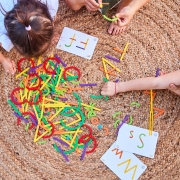
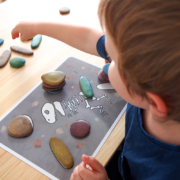 edx education
edx education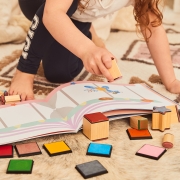 edx education
edx education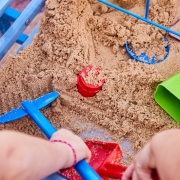
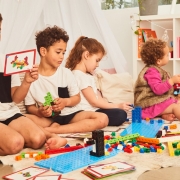
 Edx Education
Edx Education